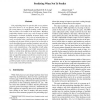215 search results - page 11 / 43 » Learning to Predict User Operations for Adaptive Scheduling |
OSDI
1996
ACM
13 years 8 months ago
1996
ACM
Traditional processor scheduling mechanisms in operating systems are fairly rigid, often supportingonly one fixed scheduling policy, or, at most, a few "scheduling classes&qu...
VLSID
2001
IEEE
14 years 7 months ago
2001
IEEE
The need for low-power multimedia processing is integral to portable and embedded devices such as cell phones, wireless terminals, multimedia handhelds and PDAs. The multimedia pr...
TSMC
2010
13 years 2 months ago
2010
In Smart Spaces (SSs), the capability of learning from experience is fundamental for autonomous adaptation to environmental changes and for proactive interaction with users. New re...
MASCOTS
2004
13 years 8 months ago
2004
File prefetching based on previous file access patterns has been shown to be an effective means of reducing file system latency by implicitly loading caches with files that are li...
AAMAS
2007
Springer
13 years 7 months ago
2007
Springer
Abstract. In the multiagent meeting scheduling problem, agents negotiate with each other on behalf of their users to schedule meetings. While a number of negotiation approaches hav...


